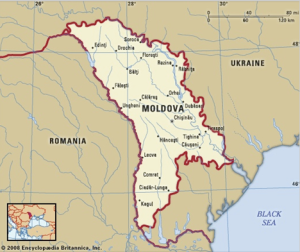About Moldova
The Republic of Moldova is a landlocked country in Eastern Europe, located between Romania to the west and Ukraine to the north, east and south. It was annexed by the Russian Empire in 1812, and when the Russian Empire dissolved in 1918, it united with other Romanian lands in Romania. After being occupied by the Soviet Union in 1940, and changing hands in 1941 and 1944 during World War II, it was known as the Moldavian SSR until 1991.
Moldavian SSR until 1991.
Moldova declared its independence from the Soviet Union on August 27, 1991, and although it has been independent since then, Russian forces have remained on Moldovan territory east of the Dniester River despite signing international obligations to withdraw
Moldova is one of the poorest countries in Europe and has high unemployment, especially in rural areas. At least 600,000 Moldovans out of a total population of 4.3 million have migrated abroad to find employment. For the rural population, migration is perceived as the only survival strategy. In some villages, more than half of the population has migrated.
As a result, nearly a third of all Moldovan children grow up without the care of one or both parents. Many of these children are left in the care of elderly parents who cannot adequately protect them. Other children live in child headed households. More than 14,000 children are in institutions, deprived of family care.
Alcohol abuse is quite common as some Moldovans see little hope for their own, or their family’s future. Many poor families have difficulty paying for school and do not see their children’s education translating into better jobs.
Moldova is one of the main countries of origin of victims of trafficking in Europe. Trafficking is a key issue for young people. Many adults and young people forced to migrate in search of work are unknowingly trafficked.
Those trafficked are mainly women of between 18 and 24 years of age. Over 10 percent are under 18 years old, some as young as 12 years old. The majority of women and girls that are trafficked come from rural areas.
Seventy-seven per cent of people trafficked from Moldova are sexually exploited. Seven per cent are trafficked to work in households, 5 per cent for begging and 15 per cent to work on construction sites.

